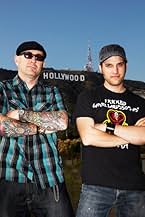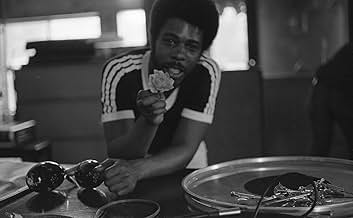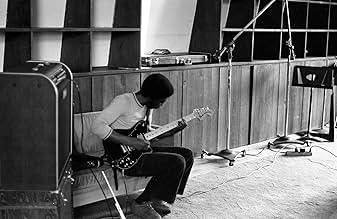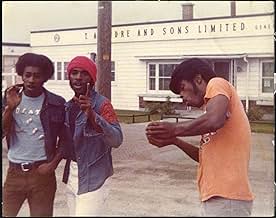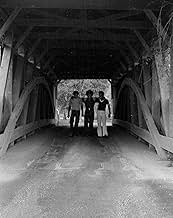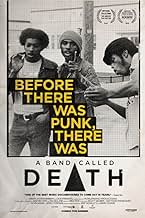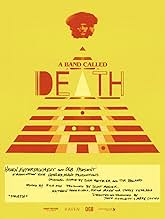PUNTUACIÓN EN IMDb
7,5/10
4,1 mil
TU PUNTUACIÓN
Añade un argumento en tu idiomaA documentary on the 1970s punk trio Death, and their new-found popularity decades after they disbanded.A documentary on the 1970s punk trio Death, and their new-found popularity decades after they disbanded.A documentary on the 1970s punk trio Death, and their new-found popularity decades after they disbanded.
- Dirección
- Reparto principal
- Premios
- 7 premios y 3 nominaciones en total
Bobby Hackney
- Self - bass and vocals, Death
- (as Bobby Hackney Sr.)
David Hackney
- Self - guitar, Death
- (metraje de archivo)
Earl V. Hackney Jr.
- Self - not a member of Death
- (as Earl Hackney Jr.)
The Beatles
- Themselves
- (metraje de archivo)
The Who
- Themselves
- (metraje de archivo)
Lambsbread
- Themselves
- (metraje de archivo)
Reseñas destacadas
A moving and rocking tribute to one of the pioneering Rock bands, "A Band Called Death" is a celebration of the power of family, brotherhood and great, timeless music. In early - 1970s Detroit three black brothers inspired by the Rock bands of their time decide to form a group where they eventually changed music forever. Jamming up a compelling mix of Hard Rock, Funk and Soul with a then unheard of sound called Punk the Hackney brothers raised up a storm infuriating neighbors and challenging the music establishment with their then controversial band name and music. This rockumentary features the band's origins growing up in a musical family and how they differed with the black community of the time with their choice of music. Their experience with tragedy at an early age and their disappointments with the setbacks they experienced brought the band to an end culminating with the death of one of the brothers. But fate and posterity have a funny way of meting out justice and through the surviving band members' children the group's music was rediscovered and released for a whole new generation and future ones to rock out to and enjoy. The documentary includes priceless footage and images of the stellar power trio in their prime and what followed and features interviews of the brothers and their family with individuals associated with their story. Henry Rollins, Kid Rock, Elijah Wood (!) and others add their appreciation of the seminal band. After listening to "...For the Whole World to See" for the first time I knew the band was special and they were an instant fave who I'm going to appreciate and enjoy for life. The band proved and showed with their music the warmth, power and energy that Rock's liberating force can bring and why it was and still is the greatest and most important genre in all of music. A tale of promise, tragedy and triumph "A Band Called Death" is a testament to the power of art and spirituality in overcoming the trials and tribulations of life and their deep and lasting effect in humanity as a whole.
"What good will it do to gain the world and lose your soul?" (Mark 8:36)
At some point in our lives, most of us surrender our dreams to responsibilities of life. Family, mortgages, and the careers to sustain them. All these things of life. Some necessary. Some necessary evils. And all those unfulfilled dreams follow us to our graves. Let's face it, for most of us, it takes balls to follow your dreams, because it takes balls to fail big.
"Death", and its lead-man David Hackney, had the balls to follow their dreams. Bound by faith, family, and an unshakable confidence, they followed their dream despite the odds stacked against them. They weren't afraid to fail big. They knew that their music and their vision for the band had risks.
Listening to their music, it's evident that they were way ahead of their time, and yes, unfortunately, not what the mainstream audience expected. But still, they persisted past the rejections, disappointments and heartaches, buoyed by family loyalty and love of music.
The bright light shining through the disappointment and heartache, is the love of family. The the real core and power of this movie, is how your family's love and faith doesn't fail, even when everything else has.
Here's to the dreamers. Your dreams will be realized long after your departure. Your dreams will be your legacy and your loved ones the beneficiaries.
Rock on, all you misfits.
At some point in our lives, most of us surrender our dreams to responsibilities of life. Family, mortgages, and the careers to sustain them. All these things of life. Some necessary. Some necessary evils. And all those unfulfilled dreams follow us to our graves. Let's face it, for most of us, it takes balls to follow your dreams, because it takes balls to fail big.
"Death", and its lead-man David Hackney, had the balls to follow their dreams. Bound by faith, family, and an unshakable confidence, they followed their dream despite the odds stacked against them. They weren't afraid to fail big. They knew that their music and their vision for the band had risks.
Listening to their music, it's evident that they were way ahead of their time, and yes, unfortunately, not what the mainstream audience expected. But still, they persisted past the rejections, disappointments and heartaches, buoyed by family loyalty and love of music.
The bright light shining through the disappointment and heartache, is the love of family. The the real core and power of this movie, is how your family's love and faith doesn't fail, even when everything else has.
Here's to the dreamers. Your dreams will be realized long after your departure. Your dreams will be your legacy and your loved ones the beneficiaries.
Rock on, all you misfits.
In recent years there seems to have been a cycle of music documentaries about musicians of whom success has eluded. In Anvil: the Story of Anvil we have a band who have had extremely limited success over a very long period, in Searching for Sugarman we have an artist who had extremely minor success and then disappeared only to be rediscovered a quarter of a century later to great acclaim and in 20 Feet from Stardom we have the story of singers whose work we hear everywhere but of whom remain unfairly obscure. A Band Called Death contains elements of all of these documentaries, except in this one the band didn't even release an album until 35 years after their initial demo.
Death were a Detroit proto-punk band. Not only that but they were an all-black proto-punk band, which makes them very unique. There were very few black musicians operating in this area of music back in the 70's. Its details like this that makes their story all the more unusual. Having heard their music, I have to say it was pretty good. Forget proto-punk, this stuff sounded more like post-punk. Its combination of aggression with tight highly skilled musicianship was certainly ahead of its time and sounds more like the more expansive alternative rock that followed in the wake of the punk years. I suppose, looking back on it, being so ahead of their time was one of the problems the band had in getting a record deal. Likewise, their name was a major handicap. Band leader David Hackney conceived of the name and insisted on it being retained at all costs. This of course led to the group losing the one record contract they were offered. It is testament to David's principles but it does seem like a self-defeating stance, as it's the music that counts most, the name is so much less important and we are left wondering what could have been. Of course, a name like 'Death' and music such as theirs is entirely in-step with today's contemporary alternative rock, which is why they were rediscovered to such fanfare. It's great to see them finally have their time in the sun.
The two surviving brothers are genuinely good blokes and we learn most of the story of the band from them. Their brother David died some time round about the year 2000 of lung cancer, so there is a bittersweet nature to the band's late acceptance and success. David was the main visionary of the band. He was a dreamer. It is sad that he never saw the band achieve its long-overdue success but until his dying day he always was convinced that one day people would come looking for their music. And he was proved correct. The film perhaps falls a bit short in detailing the Detroit rock scene of the time. It almost paints a picture where Death were the lone purveyors of this kind of confrontational rock music. This makes them seem more unique but it would have been good if the documentary at least acknowledged fellow Detroit pioneers such as The Stooges and The MC5. It would have put the band and Detroit itself into a bit more historical context. Also, it would have been interesting to know if they had a local following at the time and played any gigs. But, despite these minor issues, the film is still very successful because these guys were genuinely good and it's not a rose tinted spectacle affair. The film also functions as a mechanism for their music to reach an even wider audience and this in itself is a good enough reason for its existence. But the main thing is that now Death have been added to the rock family tree as an important precursor to punk and alternative rock. Even if, in the final analysis, none of that changes the fact that 'Death' is still a terrible name for a band
Death were a Detroit proto-punk band. Not only that but they were an all-black proto-punk band, which makes them very unique. There were very few black musicians operating in this area of music back in the 70's. Its details like this that makes their story all the more unusual. Having heard their music, I have to say it was pretty good. Forget proto-punk, this stuff sounded more like post-punk. Its combination of aggression with tight highly skilled musicianship was certainly ahead of its time and sounds more like the more expansive alternative rock that followed in the wake of the punk years. I suppose, looking back on it, being so ahead of their time was one of the problems the band had in getting a record deal. Likewise, their name was a major handicap. Band leader David Hackney conceived of the name and insisted on it being retained at all costs. This of course led to the group losing the one record contract they were offered. It is testament to David's principles but it does seem like a self-defeating stance, as it's the music that counts most, the name is so much less important and we are left wondering what could have been. Of course, a name like 'Death' and music such as theirs is entirely in-step with today's contemporary alternative rock, which is why they were rediscovered to such fanfare. It's great to see them finally have their time in the sun.
The two surviving brothers are genuinely good blokes and we learn most of the story of the band from them. Their brother David died some time round about the year 2000 of lung cancer, so there is a bittersweet nature to the band's late acceptance and success. David was the main visionary of the band. He was a dreamer. It is sad that he never saw the band achieve its long-overdue success but until his dying day he always was convinced that one day people would come looking for their music. And he was proved correct. The film perhaps falls a bit short in detailing the Detroit rock scene of the time. It almost paints a picture where Death were the lone purveyors of this kind of confrontational rock music. This makes them seem more unique but it would have been good if the documentary at least acknowledged fellow Detroit pioneers such as The Stooges and The MC5. It would have put the band and Detroit itself into a bit more historical context. Also, it would have been interesting to know if they had a local following at the time and played any gigs. But, despite these minor issues, the film is still very successful because these guys were genuinely good and it's not a rose tinted spectacle affair. The film also functions as a mechanism for their music to reach an even wider audience and this in itself is a good enough reason for its existence. But the main thing is that now Death have been added to the rock family tree as an important precursor to punk and alternative rock. Even if, in the final analysis, none of that changes the fact that 'Death' is still a terrible name for a band
Stuck in the shadow of Searching for Sugar Man, this tale of an all-black protopunk band from Detroit hits many of the same notes, but plays its own tune. This is a film whose appeal may be more limited than Sugar Man due to the hard and raw style of the band in question, but the music unearthed is no less vital.
Death's story is told mostly from the perspective of Bobby and Dannis Hackney, the bassist/vocalist and drummer, respectively. They recount the birth of Death and walk you through some of the places of note. We're robbed of the opportunity to hear from who we learn is the driving force behind the band, guitarist David Hackney, who sadly passed away from lung cancer in 2000. He does make appearances in the movie in the form of audio recordings and you get a sense of the unique viewpoint that gave the band its vision through these recordings and his brothers' recollections.
It's that vision that shaped Death, and ultimately, limited their potential. Being steadfast about not changing the name of the band, David felt the name went with the concept he had for the band and, as such, he was resolute. Even when record mogul Clive Davis came knocking – loving the music but hating the name – David chose to pass the opportunity by rather than compromise. This, in a nutshell, is the answer to the great mystery of how they were deprived their stardom. Fortunately, the film has more to offer than that.
It's watching Bobby's sons, and the effect his early music has on them that provides the film with its heart and makes it more than a just sad story about how elusive fame may be. Their drive and determination to get their father's music out by-any-means-necessary is inspiring to watch. The excitement with which they recall finding out their dad is a rock pioneer is written all over their faces. Bobby had instilled in his sons a deep appreciation of music of all kinds, just like his father had done for him, and it turned out they appreciated his music most of all.
Sounding like Love, The Who, Buzzcocks, The Saints, The Damned and The Real Kids all playing with The Stooges' gear, it's easy to see why there was so much excitement for Death's recent rediscovery. Chance plays such a big part in any musical success, it's little wonder that so many great artists fall through the cracks. One supposes that with the success of Searching for Sugar Man, these documentaries attempting to right musical wrongs might become their own subgenre. If that's the case, you can count me as an early enthusiast. These stories speak to the longevity of art and the way it sits there patiently, waiting to be discovered and the magic that happens when you do. As Henry Rollins puts it, "It's one of those things that keeps you going to the record store hoping for another great story like that."
Death's story is told mostly from the perspective of Bobby and Dannis Hackney, the bassist/vocalist and drummer, respectively. They recount the birth of Death and walk you through some of the places of note. We're robbed of the opportunity to hear from who we learn is the driving force behind the band, guitarist David Hackney, who sadly passed away from lung cancer in 2000. He does make appearances in the movie in the form of audio recordings and you get a sense of the unique viewpoint that gave the band its vision through these recordings and his brothers' recollections.
It's that vision that shaped Death, and ultimately, limited their potential. Being steadfast about not changing the name of the band, David felt the name went with the concept he had for the band and, as such, he was resolute. Even when record mogul Clive Davis came knocking – loving the music but hating the name – David chose to pass the opportunity by rather than compromise. This, in a nutshell, is the answer to the great mystery of how they were deprived their stardom. Fortunately, the film has more to offer than that.
It's watching Bobby's sons, and the effect his early music has on them that provides the film with its heart and makes it more than a just sad story about how elusive fame may be. Their drive and determination to get their father's music out by-any-means-necessary is inspiring to watch. The excitement with which they recall finding out their dad is a rock pioneer is written all over their faces. Bobby had instilled in his sons a deep appreciation of music of all kinds, just like his father had done for him, and it turned out they appreciated his music most of all.
Sounding like Love, The Who, Buzzcocks, The Saints, The Damned and The Real Kids all playing with The Stooges' gear, it's easy to see why there was so much excitement for Death's recent rediscovery. Chance plays such a big part in any musical success, it's little wonder that so many great artists fall through the cracks. One supposes that with the success of Searching for Sugar Man, these documentaries attempting to right musical wrongs might become their own subgenre. If that's the case, you can count me as an early enthusiast. These stories speak to the longevity of art and the way it sits there patiently, waiting to be discovered and the magic that happens when you do. As Henry Rollins puts it, "It's one of those things that keeps you going to the record store hoping for another great story like that."
This film is about more than music, Band names or 'firsts'. "A Band Called Death" is about FAMILY, FAITH and BROTHERHOOD. Loved every frame.
¿Sabías que...?
- CuriosidadesA list of all the bands the Hackney brothers have formed, in consecutive order: Rockford Funk Express (Funk) Death (Punk) The 4th Movement (Gospel) Lambsbread (Reggae) [without David] Death (Punk) ) [without David]
- ConexionesReferenced in Film Junk Podcast: Episode 423: World War Z and Monsters University (2013)
- Banda sonoraWhere Do We Go From Here?
Performed by Death
Written by Bobby Hackney (as B. Hackney)
Courtesy of Elect Music Publishing
Selecciones populares
Inicia sesión para calificar y añadir a tu lista para recibir recomendaciones personalizadas
- How long is A Band Called Death?Con tecnología de Alexa
Detalles
Taquilla
- Recaudación en Estados Unidos y Canadá
- 127.257 US$
- Fin de semana de estreno en EE. UU. y Canadá
- 34.839 US$
- 30 jun 2013
- Recaudación en todo el mundo
- 127.257 US$
- Duración1 hora 36 minutos
- Color
- Relación de aspecto
- 1.78 : 1
Contribuir a esta página
Sugerir un cambio o añadir el contenido que falta

Principal laguna de datos
By what name was A Band Called Death (2012) officially released in Canada in English?
Responde






